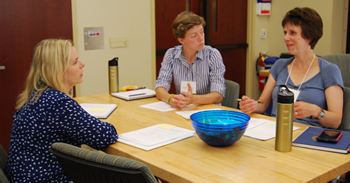 The Mathematics Education Lab focuses on factors associated with teacher development with particular attention toward curriculum studies, technology design, and teacher leadership.
The Mathematics Education Lab focuses on factors associated with teacher development with particular attention toward curriculum studies, technology design, and teacher leadership.
Projects
Click the title of the project to view the description.
Instructional Coaching in Chilean Mathematics Classes
Instructional Coaching in Chilean Mathematics Classes
In 2015, the Chilean Ministry of Education regulated that all schools adopt a new instructional framework, Decree 83, which “calls for educational communities to act with creativity and autonomy in search of diverse, flexible, and enriching educational responses that offer opportunities for participation, learning, and integral development for all of their students.” This decree is based on the Universal Design for Learning (UDL) framework which took hold in U.S. education over the past decade. The principles associated with the UDL framework are most strongly supported by an adoption of Tomlinson’s philosophy of differentiated instruction.
Through this study, we are investigating the impacts of introducing Chilean teachers to the differentiated instruction teaching philosophy through an instructional coaching model. Using this model, instructional coaches work with faculty from several schools in and around Santiago, Chile to expose them to the differentiated instruction philosophy. We are interested in learning whether this professional development model changes mathematics teacher practices and beliefs, and has an impact on student achievement, engagement or self-efficacy. We are also interested in identifying the critical components of the model that influence its efficacy.
Project partner website: Tandem Profesores
Publications
-
2018_Journal of Mathematics Education Leadership
Trinter, C. & Carlson-Jaquez, H. An examination of the nature of post-observation feedback provided to middle school mathematics teachers. Journal of Mathematics Education Leadership.
-
2017_Journal of Mathematical Behavior
Ellington, A., Whitenack, J., Trinter, C. & Fennell, S. (2017). Preparing and implementing successful mathematics coaches and teacher leaders. Journal of Mathematical Behavior, 46, 146-151.
-
2017_Journal of Mathematical Behavior
Haver, W., Trinter, C., & Inge, V. (2017). The Virginia mathematics specialist initiative: Collaborative effort among all components of the VA mathematics community. Journal of Mathematical Behavior, 46, 289-302.
-
2016_Journal of Mathematics Education
Trinter, C. & Hope, S. (2016). The absence and presence of mathematics in teacher-led interdisciplinary unit design. Journal of Mathematics Education, 9(2), 4-21.
-
2016_Journal of Computers in Mathematics and Science Teaching
Trinter, C. (2016). The importance of theoretical frameworks and mathematical constructs in designing digital tools. Journal of Computers in Mathematics and Science Teaching, 35(3), 269-293.
-
2015_Mathematics Teacher
Garofalo, J., Trinter, C. & Swartz, B. (2015). Engaging with constructive and non-constructive proofs. Mathematics Teacher, 108(6), 422-428.
-
2015_Journal of Advanced Academics
Trinter, C., Moon, T., & Brighton, C. (2015). Characteristics of students' mathematical promise when engaging with problem-based learning units in primary classrooms. Journal of Advanced Academics, 26(1), 24-58.
-
2015_Gifted Child Today
Trinter, C., Brighton, C. & Moon, T. (2015). Differentiated educational games: discarding the one size fits all approach to educational game play. Gifted Child Today, 38(2), 88-94.
-
2013_Mathematics Teacher Educator
Garofalo, J. & Trinter, C. (2013). Using simulations to foster pre-service mathematics teachers' self-assessment, learning, and reflections on teaching. Mathematics Teacher Educator, 1(2), 162-171.
-
2013_Mathematics Teacher
Trinter, C. & Garofalo, J. (2013). Mathematics Teacher, 106(2), 126-131.
-
2012_Mathematics Teacher
Garofalo, J. & Trinter, C. (2012). Tasks that make connections through representations. Mathematics Teacher, 106(4), 302-307.
-
2011_Mathematics Teacher
Trinter, C. & Garofalo, J. (2011). Exploring non-routine functions algebraically and graphically. Mathematics Teacher, 104(7), 508-513.
-
2009_NCSSSMST Journal
Garofalo, J. & Trinter, C. (2009). Multi-representational approaches to equation solving. NCSSSMST Journal, 14(2), 26-27.
-
(Under Review) Teachers as curriculum designers: inviting teachers into the productive struggle.
Trinter, C & Hughes, H. (under review). Teachers as curriculum designers: inviting teachers into the productive struggle.
Conferences
-
2017_PME-NA_Indianapolis, IN
Trinter, C. (2017, October). Teachers' experiences in interdisciplinary unit design: Where is the mathematics? Poster presented at the North American Chapter of the International Group for the Psychology of Mathematics Education, Indianapolis, IN.
-
2017_AMTE_Orlando, FL
Trinter, C., & Sevim, V. (2017, February). Examining pre-service secondary mathematics teachers' static and emergent shape thinking when engaging with non-linear functions. Paper presented at the Association of Mathematics Teacher Educators Annual Conference, Orlando, FL.
-
2016_AERA_Washington, DC
Henschel, M., McDonnough, J. & Trinter, C. (2016, April). The development of adaptive expertise practices: Results of a STEM teacher preparation program case study. Paper presented at the American Educational Research Association Annual Meeting, Washington, DC.
-
2015_AMTE_Orlando, FL
Trinter, C. & Carlson-Jaquez, H. (2015, February). Middle school mathematics teacher evaluation: The role of discipline specific feedback. Paper presented at the Association for Mathematics Teacher Educators Annual Meeting, Orlando, FL.
-
2013_AMTE _Orlando, FL
Trinter, C., Kitchell, B. & Garofalo, J. (2013, January). Using simulations to foster pre-service mathematics teachers' self-assessment, learning, and reflections on teaching. Paper presented at the Association for Mathematics Teacher Educators Annual Meeting, Orlando, FL.
-
2013_AERA_San Francisco, CA
Trinter, C., Moon, T. & Brighton, C. (2013, April). An investigation into fidelity of implementation: implications for teacher professional development. Paper presented at the American Educational Research Association Annual Meeting, San Francisco, CA.


